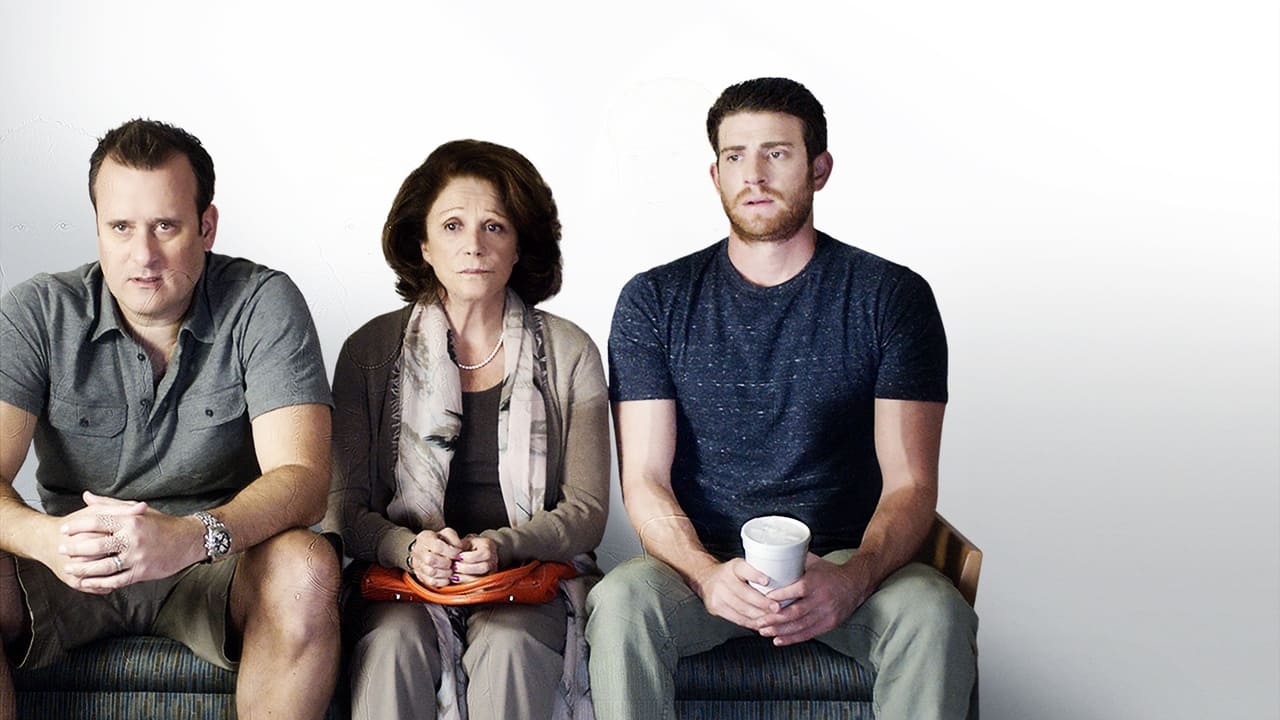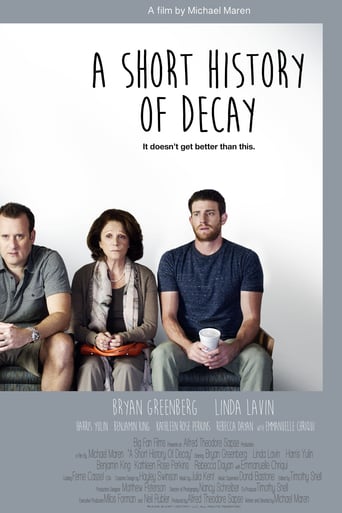CommentsXp
Best movie ever!
Pacionsbo
Absolutely Fantastic
Bluebell Alcock
Ok... Let's be honest. It cannot be the best movie but is quite enjoyable. The movie has the potential to develop a great plot for future movies
Guillelmina
The film's masterful storytelling did its job. The message was clear. No need to overdo.
rick-chappell
I'm not sure what to make of this movie. It was on the edge of being really good, but it never quite made it. That's not to say there weren't some really good things going on. The actors and their characters were good - some quite good. I really enjoyed Linda Lavin, Harris Yulin, and Kathleen Rose Perkins roles in this. The characters were well done and they actors did very credible jobs. Greenberg's character was on the weaker side - it felt like some depth would eventually come out, but nope. King as the brother was fair. Chriqui as the ex-girlfriend did a credible job, and the character was good in the beginning, and quite believable, but at the end lost any semblance of interest - and what did she do anyway? We heard law, then she appeared to be an admin, then she's writing novels? The worst character was Alex (played by Rebecca Dayan - the actress was fine, but the character was pointless). What was the point? I understood where she could have fit in, but in a movie where the plot never materialized, another subplot that went nowhere even faster was not helpful. Kind of like the artist with the painting. There was a sense that that was somehow important, but it never went anywhere.The real drawback was the story. It never really went anywhere. Of course, it appears that it never really planned to, but the viewer is left a bit let down that nothing ever happened. At least it could have let us see Greenberg's character start writing, or doing anything to justify watching him for this long. In reality, the story just showed a lot of metaphorical decays. The obvious ones were the mother and father, literally every character's life (except maybe the Irish nurse...), the car, Greenberg's relationship, King's family, Perkins career (it seems the assumption is that she gave up her education and career to take over her dying aunt's salon), Greenberg's writing career, etc. But, within the decay, there were signs of recovery - but these seemed accidental rather than planned, and there weren't enough.Each of these bits was well done, but there wasn't a coalescence into anything specific. Maybe that was the plan for the story. It just kind of has everything there in existence as the viewer passes through. I guess the message is that everything decays, and some things recover and some don't.I enjoyed it, and wanted it to do more. In the end it's hard to get emotionally invested. OK to spend 90 minutes, but don't expect too much and you may have a good time.
Mel Klein
I thoroughly enjoyed this film. The actors are excellent and inhabited their characters plausibly. Harris Yulin, the father, is pitch perfect. Linda Lavin, the mother, is good but not great. My highest praise though, is for Michael Maren for writing a good story with genuine characters and pitch perfect dialogue, no tricks, and for directing in a smooth, well paced and confident style. The turning points are organic and not contrived; if we see them coming it's because we have thoroughly bought into the story and empathize with the characters, and the story goes where we would take it. It's not easy to make such a touching film without being saccharine -- Maren succeeds with grace. This is a really good film.
Edward Shain
Small films like small books depend on one or two core elements to get it right because there's neither room nor budget for more. Writers make decisions. Producers make more decisions, and everything's in service to getting it done, getting it on the page, putting it up on the screen, and then hoping like hell the whole is greater than the sum of the parts.The usual term for such works is intimate, but usually what's meant by that is "personal." Personal films, though, are often in-your- face dramatic (or comedic) pieces depending in shock, or arcana or attitude to interest the viewer. If one intends intimate, then a lot of meaning and insight will be between the lines. Intimacy is rarely explicit, but rather reflected in the immediate comprehension of what's signified but not spoken. Often there's not much explosion, if any (though there will be dramatic pivot points). Michael Maren's film "A Short History of Decay" is a small, intimate film wholly dependent upon the relationships between the four main characters, a procrastinating ne'er-do-well younger brother (Bryan Greenberg), his older, more successful brother (Benjamin King), and their ailing parents,, a father (Harris Yulin) stricken by stroke but still competent, and a mother (Linda Lavin) disappearing into the wispy vapors of dementia (Alzheimer's) to drive the film.Indeed, the plot, as little as there is of it, is absurdly simple. The father suffers a stroke, and the two brothers end up in Florida trying to cope with what's an impossible situation: their father's rapidly declining health and their mother's descent into dementia "We're losing," the father says. He's right. The two sons hang out for a while. Small changes occur, but at the end of the film, Big brother goes back to his family, and Little brother stays on. That's it. If you're looking for special effects and loud noises, this is not that film."Decay," though, is worth whatever effort one has to exert to see it. The actors feast on Michael Maren's words, their characters plumping and prospering as Maren's dialogue lights up the complex connections, letting the audience understand changes which are percolating even as the characters in the film don't yet have a clue about it. Ultimately, at least in my view, it's the brothers who are central, the absolute one core element that has to work or the film falls to pieces.It works. In spades. The two brothers contain everything about the family worth understanding. I suspect Lavin and Yulin as the parents will garner the most attention, but watch Greenberg and King go to work here. The brothers are the product of their parents' lives, and each is facing a difficult stretch that strains the static way they'd previously the family as a unit, and their own place in the cosmos. The dialogue sings of underlying affection salted with genuine anger, bitterness and jealousy, yet leavened by commitment to their parents. Filmgoers won't get many chances in their lifetime to see relationships as beautifully drawn as this. It's worth the price of admission alone. I've no idea how this film will percolate out into theaters elsewhere, but right now it's at The Village East Cinema in New York City, 189 2nd avenue (11th & 12th streets).
talltale-1
A quietly elegant little movie (because it refuses to push anything) about family and the finale of the older generation, A SHORT HISTORY OF DECAY, written and directed by first-timer Michael Maren, is a beautifully rendered piece of Americana as it exists today, mid economic (and most every other kind of) decline. And yet this movie is not actually depressing. Oddly enough, it is simply too plain and too real for that. It accepts what is and must be (even if its characters have some difficulty doing so) and therefore liberates us, the audience, to look upon reality and understand it.Mr. Maren, shown at left, is no spring chicken; his career and interests prior to filmmaking seem to have groomed him to look at life and people and events with a dry, incisive eye. Along the way in this movie, and without making any big thing of it, he quietly nails odd moments of family behavior, sibling (and spousal) rivalry, right through to that instant in which our near-hero sees an attractive woman on the beach and a moment later we realize that it's his aging mother -- mistook or maybe remembered from a much earlier time. You don't get this kind of stuff in most American independent movies, and certainly not served up as well and in such unshowy fashion.We begin in the ever more gentrified Brooklyn, in which our slacker leading man, Nathan (the first-rate Bryan Greenberg, above), less a failed writer than one who has simply never finished anything, begins a morning dispute with his significant other, Erika (Emmanuelle Chriqui, below), a high-powered woman with a first novel about be published. How this scene ends is both funny and surprising.An unexpected phone call regarding his parents sends Nathan down to Florida, to mom (Linda Lavin, below, right), dad (Harris Yulin, below, left) and -- eventually -- older brother (Benjamin King), where, of course, family history, along with past and present problems bubble up and spill over. Aging, Alzheimer's, stroke, money problems, love and lust jockey for position, but Maren never lets any one thing take the lead for long. He juggles character and events with consummate skill, balancing the comedy of life with its inevitable tragedy -- and shows us a lot of the interesting moments in between.You might call the film a kind of comedy, but it's so quiet and unforced that you'll smile more readily than laugh out loud. The drama is certainly there, yet it's so unforced that it never for a moment becomes melodrama. Characters are written and acted very well by the entire ensemble cast -- which includes a lovely, radiant and savvy Kathleen Rose Perkins (below) as mom's manicurist; a hot, svelte Rebecca Dayan as the young lady Nathan meets at a local bar/restaurant; and Barbara Weetman as the smart, if slightly pushy bartender.What is especially remarkable here is how clever are the performers, together with their writer/director, in never going too far. They behave, rather than "act." Less is more has rarely proved so enjoyable or so on-the-mark.

